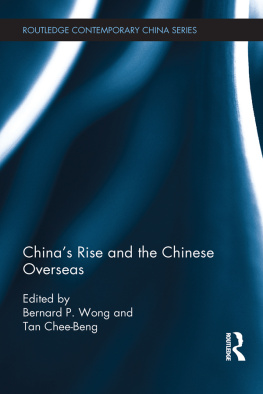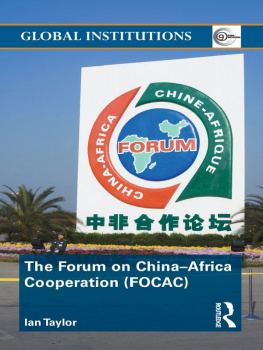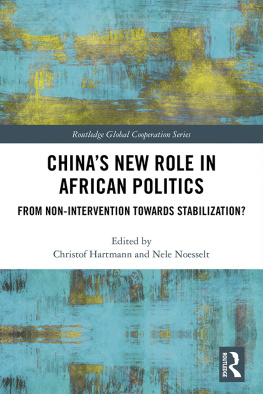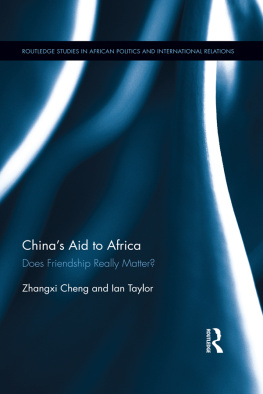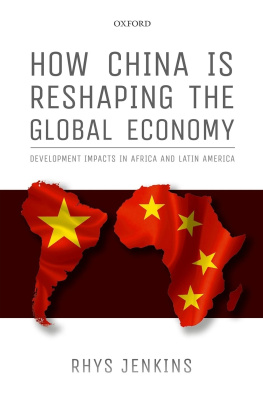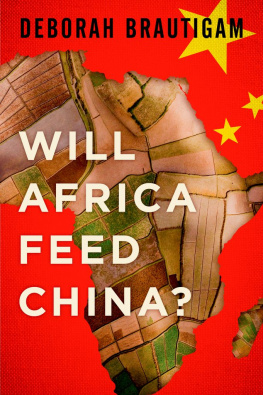THE DRAGONS GIFT
THE DRAGONS GIFT
THE REAL STORY OF CHINA IN AFRICA
DEBORAH BRAUTIGAM


Great Clarendon Street, Oxford OX2 6DP
Oxford University Press is a department of the University of Oxford.
It furthers the Universitys objective of excellence in research, scholarship,
and education by publishing worldwide in
Oxford New York
Auckland Cape Town Dar es Salaam Hong Kong Karachi
Kuala Lumpur Madrid Melbourne Mexico City Nairobi
New Delhi Shanghai Taipei Toronto
With offices in
Argentina Austria Brazil Chile Czech Republic France Greece
Guatemala Hungary Italy Japan Poland Portugal Singapore
South Korea Switzerland Thailand Turkey Ukraine Vietnam
Oxford is a registered trade mark of Oxford University Press
in the UK and in certain other countries
Published in the United States
by Oxford University Press Inc., New York
Deborah Brautigam 2009
The moral rights of the author have been asserted
Database right Oxford University Press (maker)
First published 2009
All rights reserved. No part of this publication may be reproduced,
stored in a retrieval system, or transmitted, in any form or by any means,
without the prior permission in writing of Oxford University Press,
or as expressly permitted by law, or under terms agreed with the appropriate
reprographics rights organization. Enquiries concerning reproduction
outside the scope of the above should be sent to the Rights Department,
Oxford University Press, at the address above
You must not circulate this book in any other binding or cover
and you must impose the same condition on any acquirer
British Library Cataloguing in Publication Data
Data available
Library of Congress Cataloging in Publication Data
Data available
Typeset by SPI Publisher Services, Pondicherry, India
Printed in Great Britain
on acid-free paper by
MPG Biddles Book groups
ISBN 9780199550227
1 3 5 7 9 10 8 6 4 2
For David
ACKNOWLEDGEMENTS
His gifts were tangible and generous, a South African newspaper commented when Chinese President Hu Jintao signed several aid agreements during his 2007 visit to Mozambique. But for many people, the gifts borne by the Chinese dragon are more mysterious than tangible, and much more ambiguous than simply generous. As the first impressions of Chinas rising engagement began to harden into conventional wisdom, a troubling picture arose, based on a sometimes sensational mix of fact and fiction, all circulating rapidly through cyberspace. The scale of the Chinese presence, and the obvious concerns this raised in Africa, Europe, Japan, and the United States, pushed me to return to a topic I first began to study in the 1980s. This book is the result: my effort to sort the myths of Chinese aid and economic engagement from the realities, and provide a more balanced, historically grounded, and complex picture of a phenomenon that became central to African development in the first post-millennium decade.
This book relies on nearly three decades of scholarship, but most recently on field research in South Africa, Nigeria, Tanzania, Zambia, Mauritius, Mozambique, Sierra Leone, and Zimbabwe, as well as interviews in Washington, Beijing, and Europe. I have learned from many people who know a piece of this puzzle, but especially from Phillip Snow, Ian Taylor, Daniel Large, Lucy Corkin, Qi Guoqiang, Li Baoping, Zhang Jun, Zhou Hong, Zha Daojiong, Li Anshan, He Wenping, Paul Hubbard, David Shinn, Jamie Monson, Chris Alden, Adrian Davis, Gregor Dobler, Sanusha Naidu, Mike Morris, and Adama Gaye. I acknowledge with great appreciation the many other people in China, Africa, Europe, and the US who asked questions when parts of this book were presented at seminars and conferences, or who shared their insights and experiences with me. I am particularly grateful to Anne Brautigam, Richard Brautigam, David Hirschmann, Carol Wise, and an anonymous reviewer who read the entire manuscript. Others read chapters and offered helpful advice, including David Leonard, Albert Keidel, Jamie Monson, Carol Lancaster, Julia Strauss, Martha Saavedra, and several anonymous reviewers of the proposal. Any errors are of course my sole responsibility.
I thank the German Marshall Fund of the United States, the Smith Richardson Foundation, and American University for funding portions of the research. My international team of research assistants deserves special thanks: Arthur Taillu, Remidius Ruhinduka, Dominic Liche, Hans Hobbs, Hu Di, Liang Xingni, Medesse Raissa Sonou, Lijia Gong, Meghan Olivier, Vanessa Alvarez, Melissa Klink, Hala Hanna, Ritodhi Chakraborty, Zu Yiming, Paul Colombini, and especially Tang Xiaoyang.
For their critical roles in bringing this project to print, I thank my editor at Oxford, Sarah Caro, who approached me with the idea, and Daniel Large, who first invited me to return to the topic of China and Africa. Mick Moore gave the book its title. Above all, I thank David Hirschmann, whose contributions to this book, but more importantly to my life, are beyond measure.
Deborah Brautigam
CONTENTS
LIST OF FIGURES
PROLOGUE
The Changing Face of Chinese Engagement in Africa
For three days in November 2006, Chinas capital city was host to delegations from forty-eight African states gathered for the Beijing Summit of the Forum on ChinaAfrica Cooperation. As the African leaders strode up the red carpet of the Great Hall of the People to shake hands with Chinas President Hu Jintao, the streets outside were filled with billboards saluting Amazing Africa. Hus opening speech brought waves of applause as the Chinese leader outlined a plan for a new strategic partnership and a deepening of economic cooperation with African countries. Over the next three years, the Chinese pledged to double aid, ratchet up concessional finance for trade and infrastructure and allow duty-free entry for many African exports. China would set up a fund for investment in Africa, build a hundred rural schools and thirty hospitals, and establish up to five trade and economic cooperation zones across the continent. This strategic partnership with Africa would be based, they said, on win-win cooperation.
Newspapers around the world filled with stories on the summit. Soon, think-tanks, universities, foundations and aid agencies began to organize meetings to try and understand what seemed to be an exciting or perhaps worrying new turn for African development. I attended many of these meetings. My 1998 book on Chinese aid and African development was one of the few resources for people trying to understand what a doubling of Chinese aid and the other pledges might mean for the continent.
At a conference in an ivy-covered building at Harvard University, Ndubisi Obiorah, a soft-spoken Nigerian human rights activist, told us of civil societys concerns about Chinas poor record on governance, social and environmental responsibility and the risks this posed for African countries. But as we strolled in the hallways during a break, Ndubisi told me that part of him welcomed Chinas interest: You remember, he said, a few years ago, The Economist did a cover story on Africa: The Failed Continent. My friends and I, we talked about that for weeks. It was depressing: Africa, the failed continent! And now China comes, and they are talking about business, about investment, about win-win cooperation. He smiled a bit ruefully: Who knows? Maybe this change will be good for Africa.
Next page

